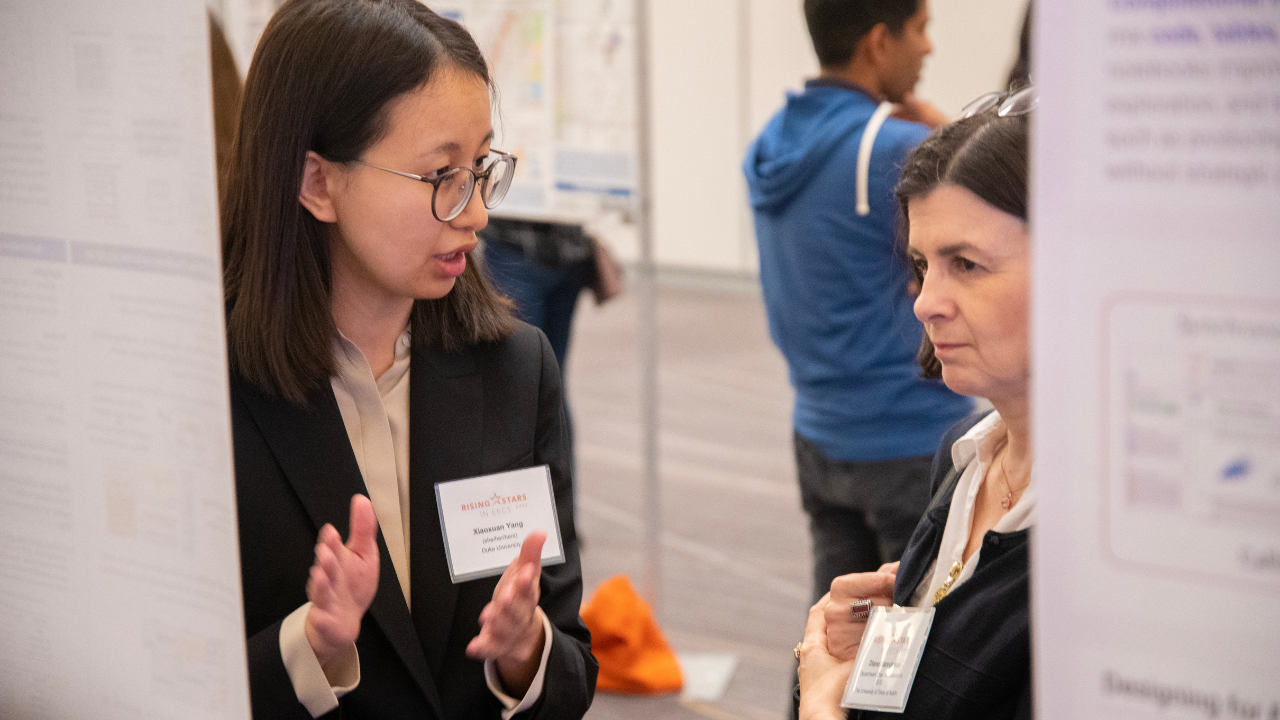Keep Your Eyes on These Rising Stars
The EECS Rising Stars program elevates PhD students and positions them for successful academic careers

Xiaoxuan Yang knows that faculty jobs are high-pressure. But she believes they have their joys as well— developing her own research program, for example, as well as mentoring students and collaborating with excellent researchers. Yang is currently working as a postdoctoral scholar at Stanford University, but next year she will join the faculty of the University of Virginia as an assistant professor.
Yang participated in the Rising Stars program while she was a fifth-year PhD student in the lab of Duke professor of electrical and computer engineering (ECE) Hai “Helen” Li, and she believes the experience was pivotal in securing her new faculty position.
Rising Stars is an intensive workshop for graduate students and postdocs who are interested in establishing academic careers in electrical engineering and computer science and who are underrepresented in their field. The program was launched at MIT in 2012 and has been hosted by the University of California, Berkeley, Carnegie Mellon University, Stanford University, the University of Illinois at Urbana-Champaign, and the University of Texas at Austin. During the workshop, participants present their own research and collect feedback from their peers and faculty mentors. They also attend panels on interviewing and promotion. Most importantly, perhaps, they have the opportunity to form connections with other rising stars.
 While a PhD student at Duke, Yang noticed that many resumes of new faculty members at institutions she admired listed participation in the program. With her advisor’s encouragement and letter of support, she applied and was accepted to Rising Stars.
While a PhD student at Duke, Yang noticed that many resumes of new faculty members at institutions she admired listed participation in the program. With her advisor’s encouragement and letter of support, she applied and was accepted to Rising Stars.
Yang said she benefited most from practicing her research presentation at the workshop. “We gave a six- or seven-minute introduction and received feedback from other rising stars and a faculty mentor,” she said. The specific advice she heard was to make her highly technical overview more relatable to people with less background in the subject. “They suggested making a connection between the research and the daily life of the audience,” said Yang. “How does this research affect or benefit the listener over the course of their own day?”
She also heard from faculty on search committees and got a behind-the-scenes look at the interview and hiring process, from the interview to negotiations of the hire.
In the following year, Bokyung Kim, another PhD student in Li’s lab, applied for the 2023 EECS Rising Stars program with the encouragement of her advisor. Kim was also accepted and will attend the workshop, which will be held at Georgia Tech University. Kim’s research, like Yang’s, lies in an emerging AI technology called persistent in-memory, or PIM, that accelerates AI algorithms.
“AI hardware presents problems because it uses conventional methods to move data around. There’s a lag in communications that harms the efficiency of the hardware,” explained Kim. “PIM has emerged to solve it—it enables computing and memorizing capabilities in a single unit, so the data doesn’t have to be shuttled back and forth. It reduces communication costs.”
The aspect of the workshop she’s most looking forward to, she said, is connecting with other ambitious young scholars who might be future collaborators in this cutting-edge area.
 But the program isn’t just for people working in AI and machine learning. Ying Chen, a fifth-year PhD student in Duke ECE faculty member Maria Gorlatova’s Intelligent Interactive Internet of Things lab, will also attend the workshop this year. Her background is in networking, but over the past several years she’s also learned to design and implement algorithms to help address problems related to human behaviors and the environment, in the context of augmented reality applications.
But the program isn’t just for people working in AI and machine learning. Ying Chen, a fifth-year PhD student in Duke ECE faculty member Maria Gorlatova’s Intelligent Interactive Internet of Things lab, will also attend the workshop this year. Her background is in networking, but over the past several years she’s also learned to design and implement algorithms to help address problems related to human behaviors and the environment, in the context of augmented reality applications.
“Augmented reality headsets are bulky and heat up after prolonged use, because of their constraints in battery capacity and computational resources,” Chen said. By designing more efficient algorithms that focus on identifying what is the most important information to be processed and retained in the system or postponed or discarded, the group hopes to improve the systems’ ease of use. It’s an effort that takes breadth of experience, and its interdisciplinary nature is what attracted Chen to Duke.
The thing she’s most looking forward to at the Rising Stars workshop, she said, is networking to seek out collaborators for similar interdisciplinary projects in the AR/VR sphere.
“I want to continue to work on my PhD project, but I’m looking forward to continuing to build my own vision for it,” she said.
The Rising Stars program will equip her do exactly that.
